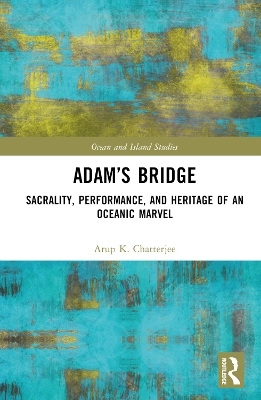
Adam’s Bridge
Routledge (Verlag)
978-1-032-33547-6 (ISBN)
Adam’s Bridge offers the first comprehensive transdisciplinary study of the famous eponymous tombolo (also known as Ram Setu) combining its sacral, historical, geological, political, performative, and heritage aspects into one framework, viewed under the critical lenses of island studies and cultural theory.
The book elucidates the entanglement of Adam’s Bridge’s discursive history with India’s colonial history, contemporary geology, domestic politics, and the nation’s emerging position in a complex geopolitical order in and around the Indian Ocean region, vis-à-vis increasing Sino-American involvement in Indo-Sri Lankan relations. Without foregrounding any absolute scientific claims on the location of the sandbars that inspired sage Valmiki’s Ram Setu and the Ramayan legacy or hindering narratives of religious faiths and folklore revolving around the structure, this intellectual historiography traces the parallel evolution of traditions of compassionate questioning and devotion for Indic sacred beliefs among commentators across the millennia from both Indian and non-Indian spectra, seen in juxtaposition with the biotic and abiotic diversity of the Gulf of Mannar and Palk Bay. Looking beyond secular-versus-religious debates, this book will be of interest to scholars of ocean and island studies, coastal economies, archipelagic geographies, environmental history, heritage studies, colonial studies, and cultural theory.
Adam’s Bridge unifies a consortium of themes, ranging across ecological and livelihood sustainability, environmentalism, soteriology, economic and geostrategic history, and the United Nations Convention on the Law of the Sea, in conceptualizing a compellingly nuanced chronicle for India’s enchanted ‘bridge.’
Arup K. Chatterjee is a professor of English at OP Jindal Global University, Sonipat, Haryana, and the founding chief editor of Coldnoon: International Journal of Travel Writing & Travelling Cultures (2011 to 2018). He is the author of the bestselling book, The Purveyors of Destiny: A Cultural Biography of the Indian Railways (2017) [republished as The Great Indian Railways (2018)], the widely acclaimed, Indians in London: From the Birth of the East India Company to Independent India (2021), and the forthcoming The Great Indian Railway Saga (2024), besides being the author of over 70 articles and academic papers in national and international publications. In 2012, he translated the Urdu poems of Firaq Gorakhpuri, published in the biography written by Ajai Man Singh, The Poet of Pain and Ecstasy (Roli 2015). His research interests include nineteenth-century colonial history, anthropology, culture, and literary studies.
Chapter 1: Prologue
Chapter 2: ‘Remnants of a Bridge’: Introduction
Chapter 3: Colonizing India’s ‘Longest’ Bridge
Chapter 4: Navigating a Postcolonial Imbroglio
Chapter 5: Adam’s Bridge and Environmentalism
Chapter 6: The Abjection of Tamil Fishermen
Chapter 7: Coalitions Against the Sethu Canal
Chapter 8: Ramifications of the Lankan Opposition
Chapter 9: Epilogue
Bibliography
| Erscheinungsdatum | 07.03.2024 |
|---|---|
| Reihe/Serie | Ocean and Island Studies |
| Zusatzinfo | 7 Line drawings, black and white; 16 Halftones, black and white; 23 Illustrations, black and white |
| Verlagsort | London |
| Sprache | englisch |
| Maße | 156 x 234 mm |
| Gewicht | 640 g |
| Themenwelt | Naturwissenschaften ► Geowissenschaften ► Geografie / Kartografie |
| Naturwissenschaften ► Geowissenschaften ► Hydrologie / Ozeanografie | |
| Sozialwissenschaften ► Soziologie ► Spezielle Soziologien | |
| ISBN-10 | 1-032-33547-5 / 1032335475 |
| ISBN-13 | 978-1-032-33547-6 / 9781032335476 |
| Zustand | Neuware |
| Informationen gemäß Produktsicherheitsverordnung (GPSR) | |
| Haben Sie eine Frage zum Produkt? |
aus dem Bereich


